Five Friends: Connections to Success
Published: July 18, 2014
By: John Mielke
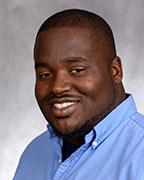 Milwaukee native Curtis Jackson knew his education was important, not only to himself but to his entire family.
Milwaukee native Curtis Jackson knew his education was important, not only to himself but to his entire family.
"I felt there was a lot riding on my college experience, for me and for my parents who were learning how to be parents of college students and how to support us in an appropriate way," he said. Jackson was the first person in his immediate family to attend a four-year college or university. His mother, Valerie, earned her associate's degree from Milwaukee Area Technical College while working full time.
Jackson remembers one of his father's favorite sayings: "I don't want you to be like me; I want you to be better than me." To make his dad's statement come true, Jackson knew he needed to go to college and succeed. "So, that is what I set out to do, and eventually ended up accomplishing that goal and more," he said.
Prior to Jackson's arrival at the University of Wisconsin-Parkside, he was unaware of challenges facing minority males in higher education. "All I knew is that when I was growing up there were not a lot of people who looked like me who were talking about the struggles of college," he said. "I went in blind, not knowing what to expect, but I had the confidence to see it through because my parents supported me 100 percent."
Jackson had also promised his great aunt – a Parkside graduate who died in 2004 – that he would complete his college education. "That served as motivation," he said. The motivation also brought pressure. Jackson was the oldest in his family and his siblings and cousins were paying close attention and looking up to him.
A Summer Bridge Program through the UW-Parkside Office of Multicultural Student Affairs (OMSA) connected Jackson to the campus even before classes began.
"The Summer Bridge gave me the opportunity to meet student leaders of color who were doing amazing things," Jackson said. "Mentor relationships grew out of those first meetings that I maintain to this day. It was inspiring for the first time in my life to see minority males who looked like me, and had similar experiences to the ones I had, talking about their experiences in a positive light."
Once Jackson became involved, he also became more aware of the challenges to success. "I made a vow: I will do everything I can to take as many people with me to success in the hopes that they, too, will grab people along the way."
Fortunately, Jackson became part of a group of five Milwaukee friends who helped each other make it through not only UW-Parkside, but through graduate school and on to the first steps in their professional careers.
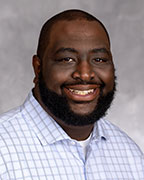
Jackson, Tony DuBose, Martel Pipkins, Terrence Shaw and Aaron Slocum formed a special bond that Slocum describes as, "like a family within a family. We were low-income college students, all from the inner city," Slocum said. "We all looked out for each other; we all made sure we were doing okay.
"We were pushing each other to be successful in terms of school, in terms of the way of living life, and making sure that no one fell by the wayside or dropped out of college."
DuBose and Shaw were the first to arrive at Parkside, a UW System campus of 5,000 students located between Racine and Kenosha in the southeastern corner of the state. DuBose quickly found two student mentors who helped him succeed in school and in student leadership.
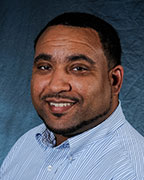
"They always told me, 'We're doing this for you, to help you, so that you can help the next group of people who come in after you.' I really took that to heart," DuBose said. "They saw some potential in me that I didn't see in myself."
Jackson and Slocum were next on campus, followed by Pipkins. Together, the five friends found a mentor in OMSA Director Damian (DJ) Evans, himself a UW-Parkside graduate. Part of Evans' responsibilities is helping students succeed. "I knew that I couldn't get to all five of them in the same way, so I looked for areas of interest that we all shared," Evans said. "I knew if I could get them to push one another, the chance they would all succeed was greater."
Evans introduced the five friends to "The Pact" a book by Sampson Davis, Rameck Hunt, and George Jenkins, three Newark teenagers who made an agreement to push each other toward their shared ambition to become doctors. Evans used "The Pact" as a way to get the five friends working toward their mutual success. "It did not produce the results I was looking for at the pace I wanted," Evans said. "Then, I began to ask them about one another, which had a more profound effect. They knew I would ask about the others, so they began to have conversations and push one another."
That tactic is now a model for success. In making a transition to an unfamiliar place, having the proper support can be the difference between success and failure. "These gentlemen decided they wanted to be successful," Evans said. "They got involved and made connections to the campus and utilized those opportunities to catapult their careers."
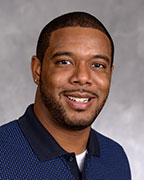 Shaw said he did not read "The Pact" until after he graduated from Parkside. He now identifies with the accountability of lasting relationships. "I knew, and know today, that I could always count on them [DuBose, Jackson, Pipkins and Slocum] to be brutally honest if I made mistakes," Shaw said. "I think that played a big role in learning to take ownership for my own experiences and to never make excuses for not succeeding."
Shaw said he did not read "The Pact" until after he graduated from Parkside. He now identifies with the accountability of lasting relationships. "I knew, and know today, that I could always count on them [DuBose, Jackson, Pipkins and Slocum] to be brutally honest if I made mistakes," Shaw said. "I think that played a big role in learning to take ownership for my own experiences and to never make excuses for not succeeding." With each other's support, the students navigated the sometimes rough seas of university life. And when they needed advice, they had a common fallback position.
"Let's go talk with DJ," Jackson said.
Early on, DuBose admits he struggled with the pace of the subjects on the college level. "I would speak with DJ about these issues and he was always there to provide me with ideas on different study habits," DuBose said. "DJ was there supporting me every step of the way, asking about my classes and if the new structure was a benefit to my success. It was DJ's genuine care and support that helped me stay focused on my goal."
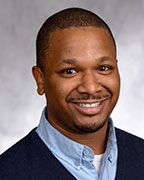
Pipkins describes Evans as a "walking, talking, 'how-to' guidebook. It was rare that a day went by without his unequivocal lectures on what it takes to be successful."
In addition to counsel from DJ and other campus advisers, Parkside offers resources to help students grow in the classroom and as campus leaders. "Parkside is great in terms giving people the opportunities to succeed and trying university life to see if it's the right fit for them," Shaw said. "The university has a lot of resources for students who are unsure about their abilities, giving them the tools to get through."
While Evans is well aware that a lower percentage of minority males graduate from college, especially African American males, he said the five Milwaukee friends did not allow the stereotypes, the challenges or what society thought their fate should be to control them. He credits their growth as students and men with the support and strength they drew from each other.
"In a time when society focuses on the negatives of African American males their age, they are five young men with graduate degrees and no criminal history," Evans said. "It is my hope of a bond never to be broken, and proof that a pact can and did work."
Jackson said the support of his friends, whom he calls brothers, motivated him to choose higher education as a profession where one of his passions is the recruitment and retention of minority males. Interestingly enough, the others have followed Jackson's lead. DuBose and Jackson received master's degrees from Ball State University and both have joined the residence life staff at the University of North Carolina at Chapel Hill.
Slocum earned his master's degree from Indiana State University and is an area director in the university's Office of Residence Life. He will begin working toward his Ph.D. in the fall semester studying educational leadership in higher education. Slocum said his experience at Parkside helped him realize that minority men coming from the inner city with odds stacked against them can be successful.
"At Indiana State, I created a community for minority men," Slocum said. "The community helps freshmen in the transition from high school to college. We focus on academic success, character development, career development, community service and leadership skills. My goal is to get more men to see the potential that they have within."
Shaw graduated Southern Illinois University Carbondale and is now a community director in Residential Life at the University of San Diego.
Pipkins completed his master's and is working at Minnesota State Mankato while pursuing his Ph.D. in sociology with emphases on globalization and women's studies. He teaches undergraduate courses, including social inequality, criminology theory, social problems, and introduction to sociology.
As for their friendship, to a man, each believes their "family within a family" bond will endure. "We don't talk to one another every day," Slocum said, "but we all have the understanding that if we need something, everyone is one phone call away."
Pipkins called the group's friendship, "the core of my undergraduate experience. While it was but only one circle in which I found myself … this was the circle that pushed for nothing short of excellence," he said. "At the same time, it was the most balanced group I've been a part of … with this group, I always knew I had someone to count on."